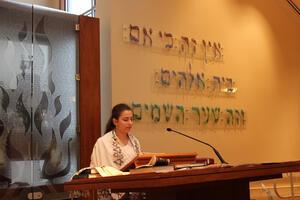Thoughts From Another Shul
Several years ago, at a sixth-grade synagogue retreat in Newton, Massachusetts, I had the opportunity to attend Saturday morning services at a shul totally unlike my own. Many things surprised me about this traditional Sephardi service. At the bar mitzvah of one olive-skinned young man, all the prayers were all in Hebrew and the service focused on G-d, not on the bar mitzvah boy. The sanctuary was small and everyone in the congregation seemed to know one another. Yet, the most striking thing about this experience was sitting behind the mechitza. The men of the congregation sat front and center, directly facing the ark and rabbi. I sat on the edge, peering through a white lace sheet at rituals in which I was not invited to participate. Some of the women half-heartedly sang along as the men praised G-d, but most seemed to primarily be focused on keeping their numerous children in place and whispering in Hebrew to their neighbors. The women seemed happy and pleasant, but when it came to the service itself were anything but integral. I was out of my comfort zone, to say the least. It struck me as strange that women, who I had always regarded as (generally speaking, of course) the more spiritual and emotional gender, should be shunted to the sideline of such a fundamental part of Jewish life.
I have an immense amount of respect for more traditional Jewish communities, Ashkenazi and Sephardi alike. Judaism cannot and should not be only one thing; and our culture’s ability to be both united and extraordinarily multi-faceted is part of what makes it so beautiful. I think that more liberal synagogues could take a few hints from the temple that I visited, with its strong sense of community, heartfelt prayers, and smiling, well-dressed people. I am by no means calling for synagogues that separate men from women to be protested, or for every Jewish community to feel and behave like my Jewish community. I concede that my singular visit to this temple by no means makes me an expert, and that I am sure there are many things I do not and will not ever understand about a community that I have never been a part of. That said, the experience of sitting behind the mechitzah allowed me to appreciate how great it is to feel that I am truly a part of the service. I love the sense that women are not only present in synagogue life, but are in fact quite central to it. Hearing my foremothers listed in prayers alongside my forefathers and not as a second thought serves as a constant reminder that our tradition is in fact full to the brim with strong women, despite years and years and years of fairly male-centric interpretation. This reality means that being a female does not preclude you from reading Torah on the Bimah, or leading your community in prayer with your voice as proud as Miriam at the sea, or reading a sermon with wisdom like that of Deborah. Women have real, vibrant, proud role models waiting in our scripture to be discussed and criticized and praised. And they have the capacity to teach us that our relationship with our religion can be as loud and as public and as important as that of our male counterparts.
Emil Hirsch, a major reform movement rabbi in the 1920s, once said, "The opportunities for the Jewish woman to reform her own religious home are many. What the synagogue needs now foremost is intelligent enthusiasm. It is woman who owns this gift." I am not sure I can completely agree with Hirsch that the gift of “intelligent enthusiasm” belongs solely to woman. The concept that women can only be one thing or that men can only be one thing has been proven again and again to be false. While certain character traits do appear to be more feminine or more masculine, blanket statements about what a certain gender can or cannot offer are dangerous and often tend to erase people who do not fit into the gender binary. Like Judaism itself, each individual is made up of a vast variety of traits, and it is in our best interest to give all people the opportunity to capitalize on their own strengths, whatever they may be. Each of us, regardless of gender, has something different to contribute to our homes, to our culture, and to our synagogues.
This piece was written as part of JWA’s Rising Voices Fellowship.







